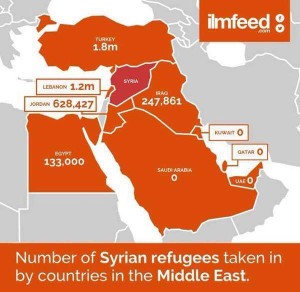- ISIS will use the Muslim refugees as a Trojan Horse to insert military-aged-male terrorists into the United States!
This fallacy is centered on a pair of false premises: 1) the majority of Syrian refugees consist of military-aged-males (MAMs), and 2) Islam is synonymous with terrorism.
The images of Syrian “refugees” depicting mostly men are not representative of the populations undergoing the U.S. Refugee Admission Program process. Basically, if he’s in Europe, he’s not in a UNHCR camp. The most vulnerable refugees in the camp will be evaluated for resettlement in the U.S.. According to a senior government official, 75% of all Syrian refugees resettled in the U.S. to date are children and adults over 60. There are many female-headed households or extended families, in which the former breadwinner is missing. Only two percent are single men of ‘combat age.’ Recall that these are the individuals deemed most vulnerable and have been victims of atrocities at the hands of the Assad regime or ISIS.

Interestingly, many of the people posting anti-Muslim rhetoric are also (justifiably) angry that the primarily Muslim interpreters who aided coalition forces in Iraq and Afghanistan are struggling to immigrate to the U.S. The #SaveDave campaign highlights the case of an Afghan interpreter, living under constant threat of death from the Taliban and ISIS for his assistance to U.S. forces.
- We can’t afford to take in any more people until we take care of homeless vets!
This final fallacy suggests that we should not use our resources on foreigners until we have fully cared for people here at home. The most frequently mentioned population is homeless veterans. Admittedly, there are many problems in our country that warrant attention. However, the concomitant organizations and authorities addressing these matters span federal, state, and local jurisdictions. Numerous non-profit organizations fill some of the gaps.
Government spending works in parallel, rather than in sequence. We don’t fund our schools after we fix the roads, and don’t pay our soldiers after we provide unemployment assistance. These government programs exist simultaneously. Scraping the Refugee Assistance Program off out the budget would not automatically shift that money to veteran homelessness.
On arrival, private resettlement agencies, often faith-based, help refugees with goods and services, including housing, furniture and clothing, employment services, etc. Refugees are legal, documented immigrants, and when they begin working they become taxpayers, even before becoming citizens. Welcoming refugees will help them integrate into their communities, their children will do better in school, and they will have better prospects for employment. All of which will ensure they become contributing members of our communities.
Look, I know confirmation bias is a bitch, and I hope that anyone genuinely concerned about the rhetoric and curious about the facts was able to learn something by reading this. Islamic terrorism is a real threat to our country, but the vast security apparatus constructed after 9/11 to screen refugees works. Compassion is not a zero-sum game; one can care about more than one vulnerable population simultaneously. It would be tragically ironic if these refugees arrived and were greeted with persecution and hatred…the very things that drove them from their homes to begin with.
This article first appeared in The Havok Journal on 25 November 2016 and was slightly updated before re-publishing.
Buy Me A Coffee
The Havok Journal seeks to serve as a voice of the Veteran and First Responder communities through a focus on current affairs and articles of interest to the public in general, and the veteran community in particular. We strive to offer timely, current, and informative content, with the occasional piece focused on entertainment. We are continually expanding and striving to improve the readers’ experience.
© 2024 The Havok Journal
The Havok Journal welcomes re-posting of our original content as long as it is done in compliance with our Terms of Use.

